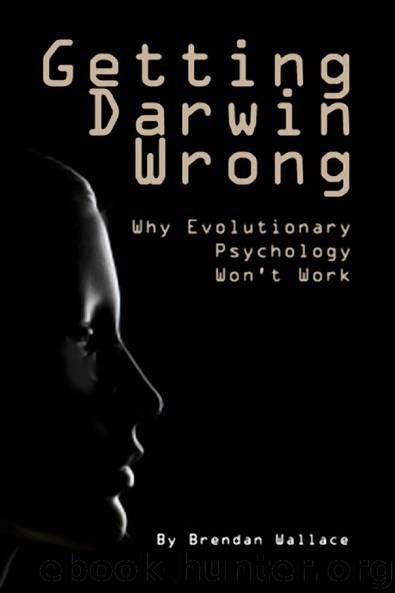Getting Darwin Wrong by Brendan Wallace

Author:Brendan Wallace
Language: eng
Format: epub
Tags: Psychology, evolutionary psychology, Steven Pinker, brain, brain as computer, philosophy, biologism, Darwin
ISBN: 9781845405786
Publisher: Andrews UK Limited 2013
Published: 2013-07-24T00:00:00+00:00
This is a fairly complex passage, but reading it closely reveals it to be yet another exercise in question begging. The key sentence, I think is ‘Science, after all, is about the principles that make things work ...’. This is true. But this begs the question: is it in fact the case that the brain works by algorithms working on representations? If this was the case, the Pinker would have won the argument and I wouldn’t be sitting here writing this book. Yet again, Pinker is merely clearing the ground for an argument: he is making it clear that this theory is possible and should be taken seriously. And we sit and wait for the argument itself. But the argument never comes. And finally Pinker points out that the idea that thought arises, so to speak, from meat, is equally incredible, which is true but irrelevant because we know for a fact that human beings are conscious, whereas whether or not computers could ever be conscious is precisely what is in question.
Round Three
In How the Mind Works he then goes on to discuss the theories of Roger Penrose (we met Penrose before, in the context of his discussions with Stephen Hawking), in his book The Emperor’s New Mind. (Penrose, 1990). However, he limits his discussion entirely to Penrose’s own theories (Penrose has attempted to link quantum mechanics to consciousness). I am in sympathy with this critique as I don‘t buy Penrose‘s ideas either. However, this misses the key point, yet again: just because Penrose is wrong it does not follow that Pinker (or anyone else in the field of EP) is right. Indeed, looking through The Emperor’s New Mind there are many interesting snippets that one might have thought would be greatly of interest to anyone in the cognitivist/EP camp. For example, after acknowledging that on a cursory, superficial glance, the actions of neurons might seem similar to those of logic gates in a digital computer Penrose continues ...
we should (also) consider various differences between brain action and present-day computer action that might possibly be of significance. In the first place I have oversimplified somewhat in my description of the firing of a neuron as an all-or-nothing phenomenon. That refers to a single pulse travelling along the axon, but in fact when a neuron ‘fires’ it emit’s a whole sequence of such pulses in quick succession. Even when a neuron is not activated, it emits pulses, but only at a slow rate. When it fires, it is the frequency of these successive pulses which increases enormously. There is also a probabilistic aspect of neuron firing. The same stimulus does not always produce the same result.
Moreover, brain action does not have quite the exact timing that is needed for electronic computer currents; and it should be pointed out that the action of neurons at a maximum rate of about 1000 times per second is very much slower than that of the fastest electronic circuits, by a factor of about 10 -6.
Download
This site does not store any files on its server. We only index and link to content provided by other sites. Please contact the content providers to delete copyright contents if any and email us, we'll remove relevant links or contents immediately.
Rewire Your Anxious Brain by Catherine M. Pittman(18631)
Talking to Strangers by Malcolm Gladwell(13339)
The Art of Thinking Clearly by Rolf Dobelli(10407)
Mindhunter: Inside the FBI's Elite Serial Crime Unit by John E. Douglas & Mark Olshaker(9310)
Becoming Supernatural by Dr. Joe Dispenza(8194)
Change Your Questions, Change Your Life by Marilee Adams(7732)
Nudge - Improving Decisions about Health, Wealth, and Happiness by Thaler Sunstein(7689)
The Road Less Traveled by M. Scott Peck(7583)
The Lost Art of Listening by Michael P. Nichols(7485)
Mastermind: How to Think Like Sherlock Holmes by Maria Konnikova(7312)
Enlightenment Now: The Case for Reason, Science, Humanism, and Progress by Steven Pinker(7303)
Win Bigly by Scott Adams(7181)
The Way of Zen by Alan W. Watts(6589)
Daring Greatly by Brene Brown(6500)
Big Magic: Creative Living Beyond Fear by Elizabeth Gilbert(5739)
Grit by Angela Duckworth(5592)
Ego Is the Enemy by Ryan Holiday(5406)
Men In Love by Nancy Friday(5225)
The Laws of Human Nature by Robert Greene(5154)
